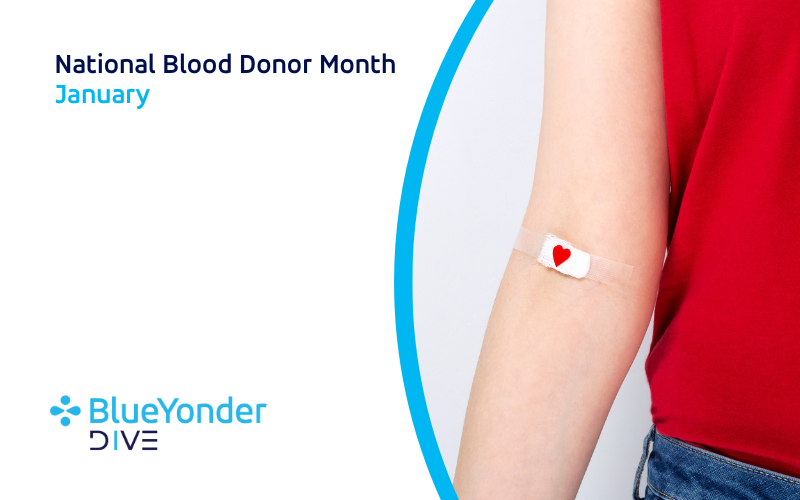January is National Blood Donor Month in the U.S. The month was proclaimed in January 1970 by Senate Joint Resolution 154 to pay tribute to voluntary blood donors and encourage new donors to join. Blue Yonder associate Kathy Machacon, who has been donating blood and platelets for 20 years, shares why she continues to donate. In this time, her donation center estimates she has saved over 400 people!
I am a superhero. Or so I’ve been told. Regardless of what you call me though, I’ve saved over 400 lives.
My family has a long history of service, so when I turned 18, I looked into giving blood. I am O+ which is the most common blood type and always in demand, so I began to donate regularly. Our bodies are absolutely amazing and continuously produce what we need, so why not donate what my body does naturally? It always saddened me greatly to think that someone could die simply because there wasn’t enough blood on hand at the hospital.
Some quick facts about Type O:
- 37% of the population has O+ blood
- 57% of Hispanics are Type O (positive or negative)
- 51% of African-Americans are Type O (positive or negative)
- 45% of Caucasians are Type O (positive or negative)
After about a year of donating whole blood, I was approached and asked to consider donating platelets. Platelets are the “sticky” part of our blood that forms clots to stop or prevent bleeding. As it turns out, my body produces far more platelets than the average person so I can donate three units in the time it takes others to donate one. The greatest need for platelets is with cancer patients (chemo treatments kill their platelets), and individuals undergoing any surgery that requires a blood transfusion, especially emergency surgery that usually requires a greater volume.
There are some notable differences between blood donation and platelet donations:
- Donating whole blood takes about 15 minutes, where donating platelets takes about an hour and a half.
- Whole blood can be donated once every 56 days, up to six times a year.
- Platelets can be donated every 7 days, up to 24 times a year.
- Whole blood donations have a shelf life of 35 days.
- Platelet donations have a shelf life of only 5 days.
When donating platelets, a single needle is inserted into one arm. Whole blood is drawn out and run through a centrifuge which separates the platelets. That volume is then replaced with a saline solution and returned to your body. There have been a lot of updates over the years and a typical donation now includes watching a movie, with drinks and snacks provided while you’re hooked up. Most centers even have popcorn for those cinema purists. Tablets with headphones are at each station with several streaming services available for the donor to choose from.
I know a lot of people are hesitant to donate platelets because of the time involved. I’ve always looked at it through the lens that if those two hours will give someone the gift of life, then it is time well spent. I’m losing nothing and am giving someone’s mom, dad, sister, brother, and other family and friends another chance. It’s a bonus that I get to do it while watching a movie of my choice. How much easier does it get than that?
The need for platelets is always great, but becomes especially critical around the holidays. Donors go out of town and are not available, but compounding the need is that with increased holiday travel also comes increased vehicular accidents. When there is already a shortage, the spike in need becomes a very real problem.
I’ve heard people express a fear of needles. My reply has two parts… First, I’ve had paper cuts that hurt worse than a donation needle. Secondly, what wouldn’t you do to save the life of someone you love? Would you really not save their life because you were scared of a needle prick that lasts for about three seconds?
If you meet the requirements, I cannot overestimate the importance of blood and platelet donations. Please check with your local donation center. You don’t have to jump into the deep end… you can start with whole blood. Discuss with the staff at your local donation center. If it turns out you’re a good candidate for donating platelets, then give it a shot. You never know whose life you might be saving.
To find a blood donation center near you, check: americasblood.org.

